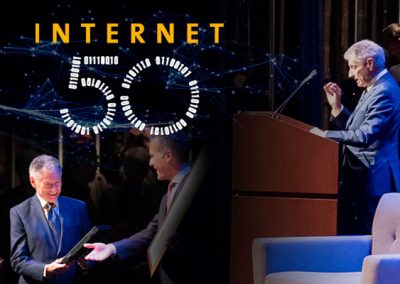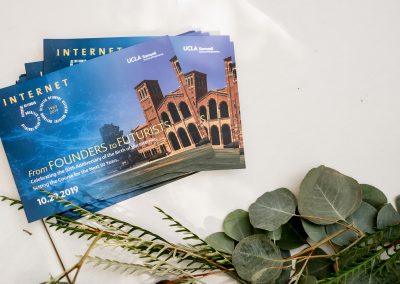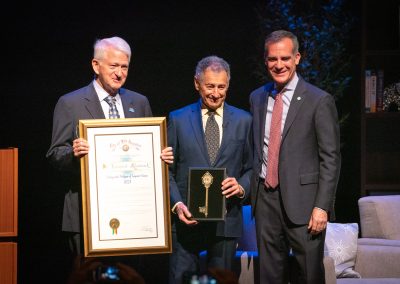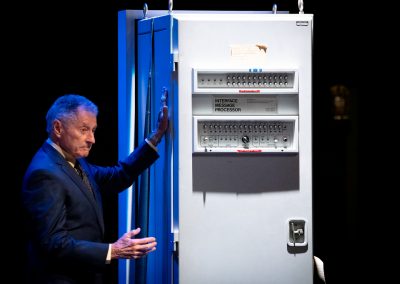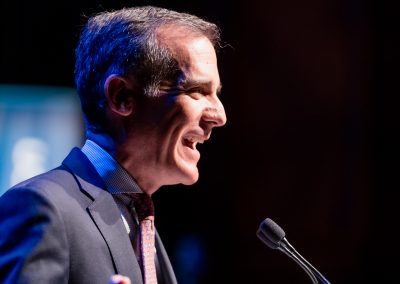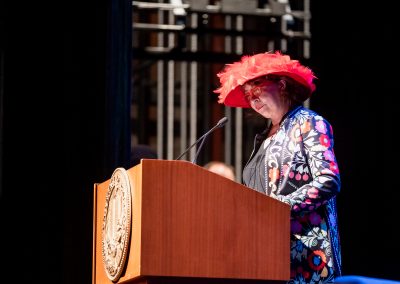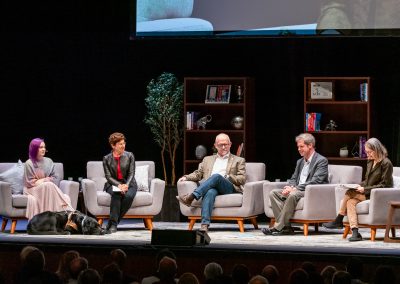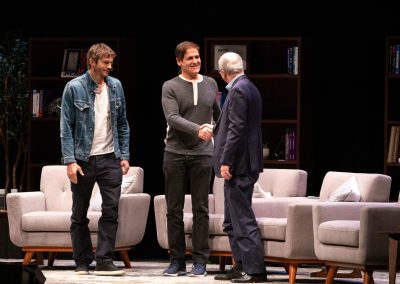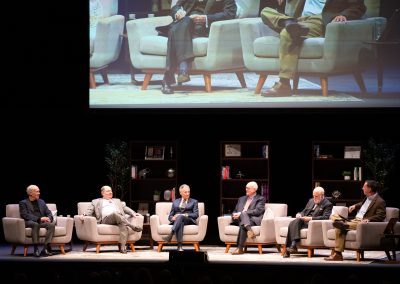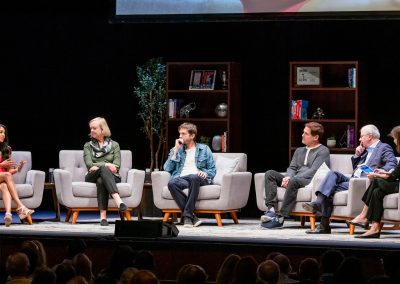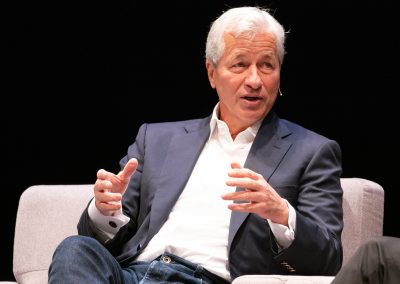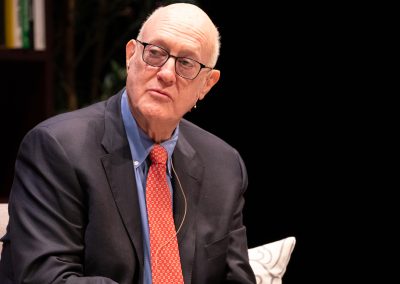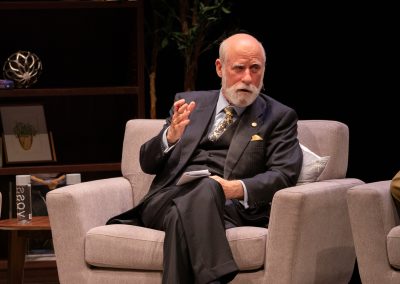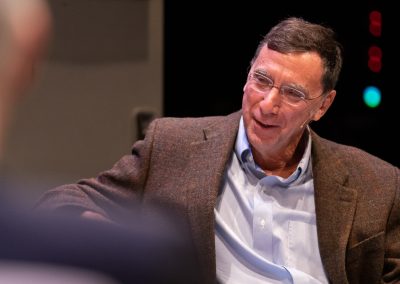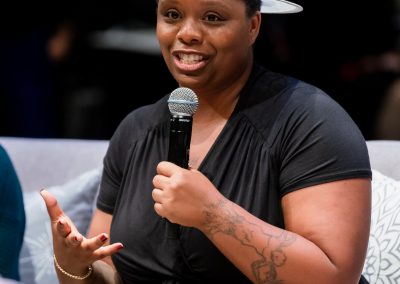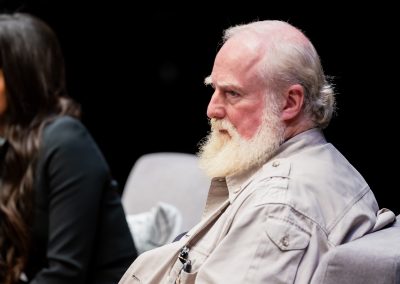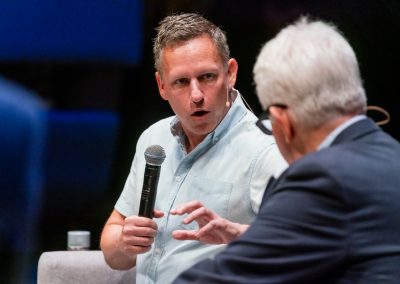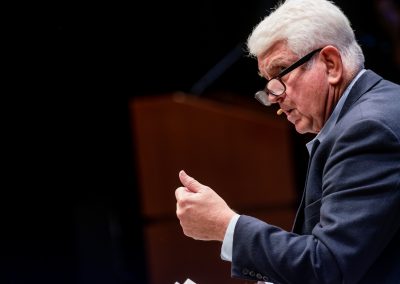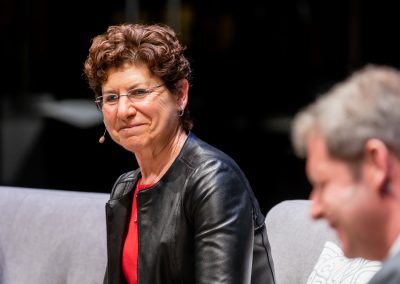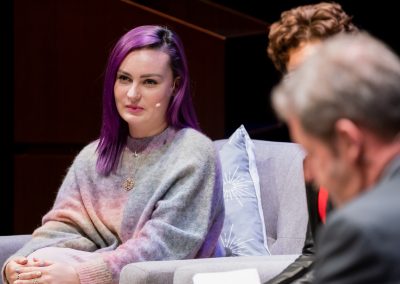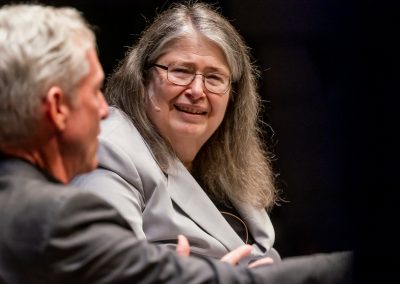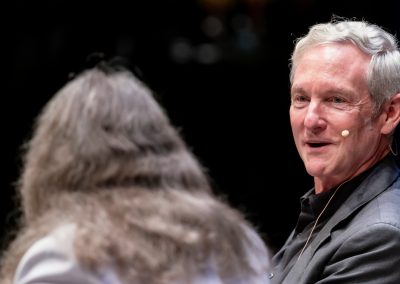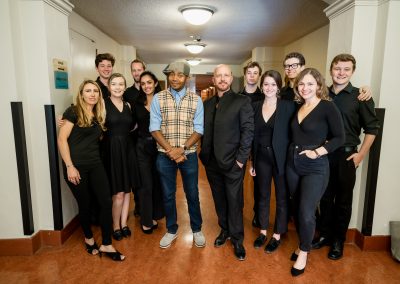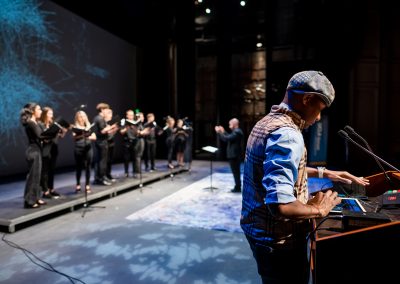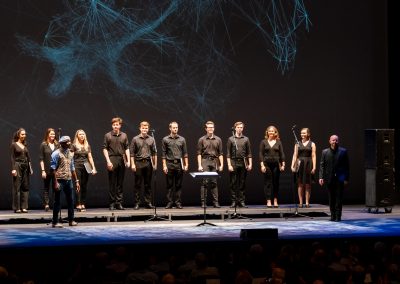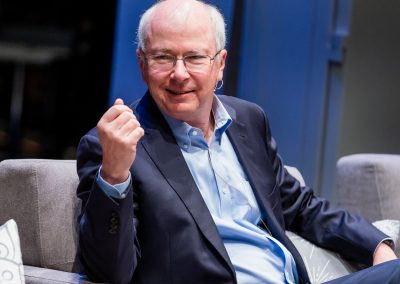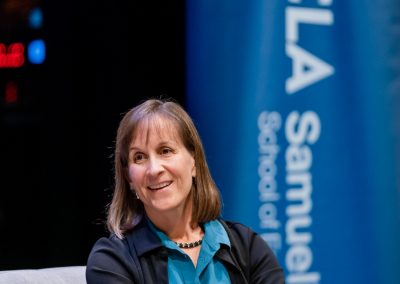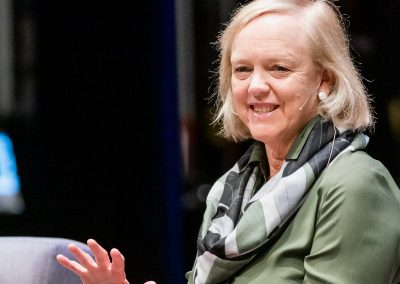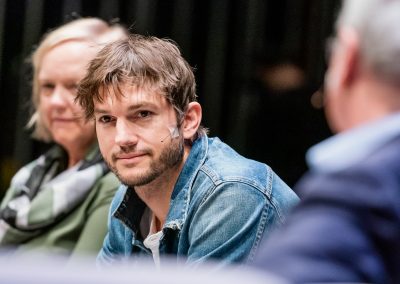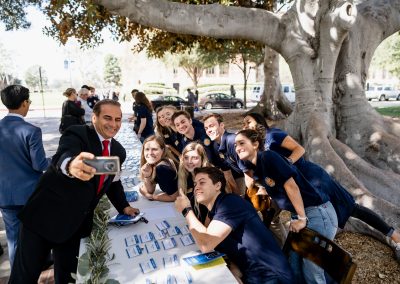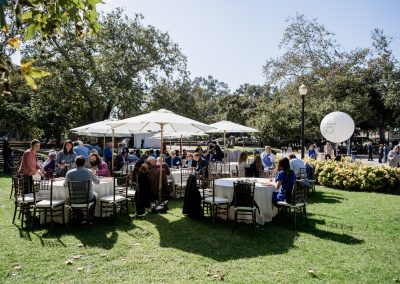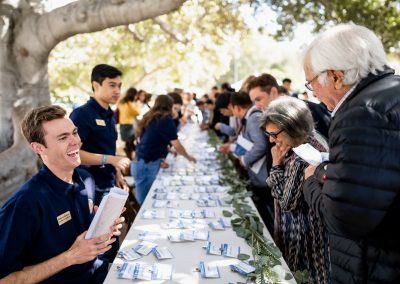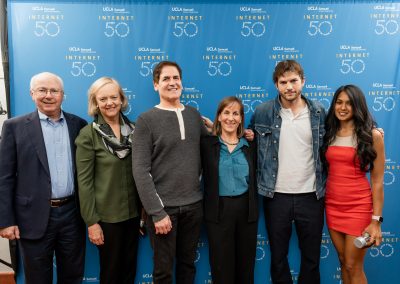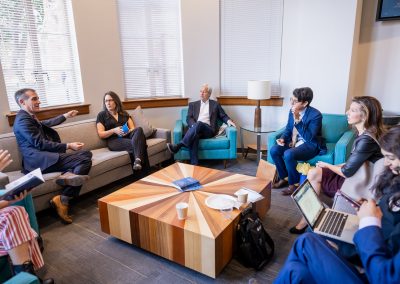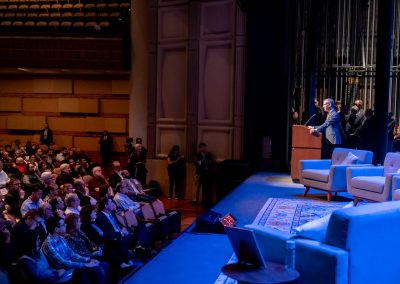
A packed Royce Hall on the UCLA campus Tuesday saw dozens of tech pioneers, business leaders and activists share the stage to examine the history and current state of the internet, and offer ideas on how it can improve.
The day-long Internet50 event was held to celebrate the 50th anniversary of the internet. On Oct. 29, 1969, in UCLA computer science professor Leonard Kleinrock’s research laboratory, the first message on the precursor to the internet was sent from 3420 Boelter Hall to Stanford Research Institute.
Los Angeles Times columnist Patt Morrison was the event’s emcee.
Following UCLA Chancellor Gene Block’s welcome remarks, Los Angeles Mayor Eric Garcetti surprised Kleinrock with the key to the city, noting he has only honored someone in this fashion a handful of times previously.
The morning panels kicked off with network pioneers, including Kleinrock, Vint Cerf, Steve Crocker, Charley Kline and Bill Duvall, on the research that led to the internet, and the early days before the rise of the World Wide Web.
The second panel featured JPMorgan Chase chairman and CEO Jamie Dimon and former Google CEO Eric Schmidt on the role of big businesses.
Right before lunch, Dallas Mavericks’ owner and entrepreneur Mark Cuban, actor and investor Ashton Kutcher and others explored the disruptions that might shape the internet of the future.
The afternoon also witnessed a full slate of panels and discussions, starting off with Akamai CEO Tom Leighton on the issue of online privacy.
A panel on “The Irresponsible Internet” included YouTuber Molly Burke, GOP consultant Rick Wilson and others discuss dealing with hate on the internet and how technologies can be used more responsibly.
Entrepreneur and investor Peter Thiel and internet pioneer Bob Metcalfe debated the trajectory of innovation today.
The panel on “The Internet Megaphone” explored how the internet’s capability to “flatten” the landscape where anyone can talk to anyone, the toxic culture that comes with that, and what can be done to fight back and improve society. Patrisse Cullors, Jameela Jamil and Katelyn Ohashi all gave examples from their personal experiences in fighting against negativity while attempting to put out positive messages and shift the paradigm.
Looking forward, the panel on “Future Internet Technology” saw Broadcom co-founder Henry Samueli, DARPA director Steven Walker and others discussed what the next 50 years might bring.
The late afternoon featured a surprise appearance by Werner Herzog, director of the documentary “Lo and Behold: Reveries of the Connected World.”
Chess grandmaster, author and activist Garry Kasparov then delivered an essay on “A Broad Vision for the Future.”
After a full day of discussion, history lessons, big ideas and spirited debate, Kleinrock summarized the theme that so many on the Royce Hall stage had been discussing about the internet’s present direction.
“We have to get back to the ethos that we talked about earlier – freedom, open, shared, trusted,” he said. “And we have to embrace the rest of the planet that’s not yet on this system. Now these sound like lofty words, and they are, and naïve sounding. But we’re talking about 50 years of vision going forward. So we want to think large.
“The worst mistake we can make is to set our sights too low, burdened with the constraints of today, and not the possibilities of tomorrow,” Kleinrock continued. “If we can’t return to the internet I knew, let’s direct it to the world we’re willing to inhabit. See you in 50 years.”
Video Gallery
RECORDED LIVE STREAM
Celebrating the 50th Anniversary of the Internet
Internet 50th Anniversary Highlights
Celebrating the 50th Anniversary of the Internet
Poll Results
Do you think the early pioneers were...
Do you think the early pioneers were…

Visionaries who understood the future impact of their work.
Pragmatic engineers trying to solve immediate problems.
Short-sighted and surprised at the results of their work.
I feel the following way about my own personal privacy on the Internet...
I feel the following way about my own personal privacy on the Internet…
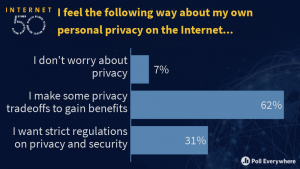
I don’t worry about privacy.
I make some privacy tradeoffs to gain benefits.
I want strict regulations on privacy and security.
Is it time to break up the Internet Giants?
Is it time to break up the Internet Giants?
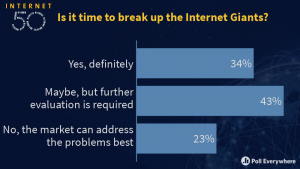
Yes, definitely.
Maybe, but further evaluation is required.
No, the market can address the problems best.
How do you feel about the Internet's impact on society in the future?
How do you feel about the Internet’s impact on society in the future?
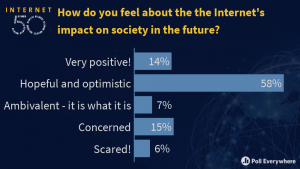
Very positive!
Hopeful and optimistic.
Ambivalent – it is what it is.
Concerned.
Scared!
Do the Internet Giants of today take sufficient responsibility for their cultural, societal, business, and political impact?
Do the Internet Giants of today take sufficient responsibility for their cultural, societal, business, and political impact?
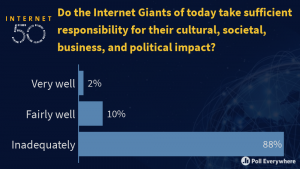
Very well.
Fairly well.
Inadequately.
How should we best manage the viral power of the Internet for positive outcomes?
How should we best manage the viral power of the Internet for positive outcomes?
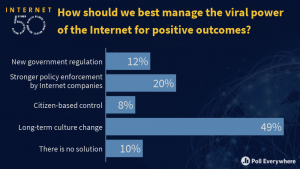
New government regulation.
Stronger policy enforcement by Internet companies.
Citizen-based control.
Long term culture change.
There is no solution.
What's the most exciting area of research for future Internet technologies?
What’s the most exciting area of research for future Internet technologies?
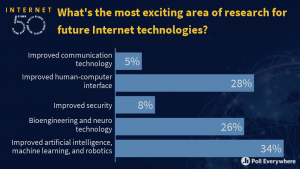
Improved communication technology.
Improved human-computer interface.
Improved security.
Bioengineering and neuro-technology.
Improved artificial intelligence, machine learning, and robotics.

